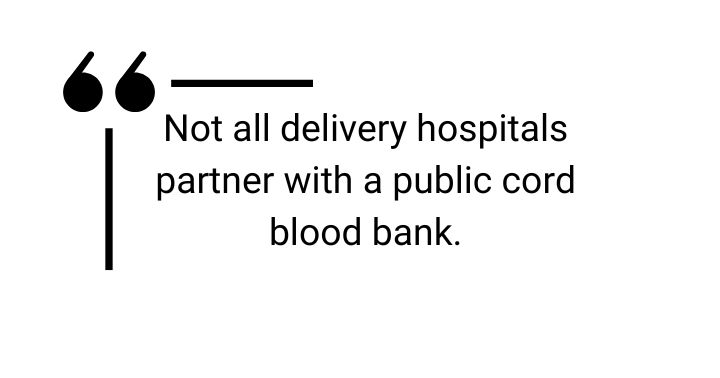
Cord blood is a rich source of stem cells that researchers use to develop treatments for people with cancer, leukemia, sickle cell disease, and other illnesses. Here are some cord blood donation facts you must be aware of.
Cord Blood Donation Facts
1. Fact: Cord Blood Donation is Worth It
The umbilical cord fluid contains stem cells that may treat cancer and blood diseases, such as immune system disorders. The fluid has 10 times more stem cells than the cells collected from bone marrow.
When donating cord blood, there’s no storage fee. It means that the donated cord blood is available for anyone who needs it.
Private cord blood banking, on the other hand, entails fees that can be expensive in the long run.
The American College of Obstetricians and Gynecologists (ACOG) does not recommend cord blood banking or advise against it. But AAP and AMA caution parents about storing cord blood.
Read: Can Cord Blood Help Parkinson’s
2. Fact: Cord Blood is Special
As mentioned, it contains stem cells that may cure cancer and some blood diseases. Collecting it is not risky to the donor, unlike bone marrow which is invasive and painful.
Cord blood is also a good source of stem cells that could be used for possible treatments and medical therapies.
3. Fact: Cord Blood Donation is Beneficial for Ethnic Minorities
It is especially important because a partial match is acceptable. Thus, minority patients can find a suitable unit for treatment. African-Americans are likely to suffer from sickle cell disease. thus, they can benefit from cord blood transplants.
Because of the ethnic diversity in California, the state is an ideal place to enhance cord blood collection. Members of minority groups can find a match. They can also access life-saving treatments.
Read: Why Cord Blood is a Good Option?
4. Fact: Cord Blood Donation is Free
As mentioned, donating cord blood does not entail any fee. It is not like saving your child’s cord blood.
Public cord blood banks will cover all the costs associated with collecting, processing, and storing the units. However, once donated, you can longer access the cord blood.
Rather, it will be available to people who need it. Public cord blood banks can also submit the units for research.
If you decide to use a family cord blood bank, you will be saving the cord blood for future uses. But it entails a fee. This bank will charge you for collection and you will pay for yearly storage fees.
Read: Is There a Good Reason to Save a Cord Blood?
5. Fact: Cord Blood Donation Must Meet Basic Guidelines
Just because you donated your child’s cord blood, does not mean that it can be used for research or by someone. Cord blood units must meet specific quality standards before they are processed, frozen, and stored.
To be transplanted, the cord blood must have sufficient blood-forming cells. If there are few cells, the unit can’t be listed on the cord blood registry. However, it can be used in research.
The mother’s health must also meet basic guidelines. In that case, the blood sample should be free from medical concerns. If the unit meets the standards, it is frozen and listed on the registry. It will be accessible to patients who need it.
6. Fact: Cord Blood Donation is Not Available to All Hospitals

Not all delivery hospitals partner with a public cord blood bank. If your delivery hospital is not affiliated with a cord blood bank, it can’t collect the cord blood. On the other hand, you may contact the bank for an eligibility assessment.
But there is no opportunity to donate cord blood if the delivery hospital does not collect units for a public cord blood bank.
7. Fact: Cord Blood Donation Requires Mother to Contact a Public CBB Before Due Date
If you want to donate your cord blood, you must talk to your doctor as early as possible. In this way, he can contact a cord blood bank for eligibility assessment.
8. Fact: Cord Blood Donation Will Not Change Your Labor
Whether you donate your cord blood or not, your labor and delivery will not change. If it is time to deliver your baby, the focus is on you and your baby. The collecting team will not obtain blood from your baby.
Instead, it will collect the cord and placenta after your baby is born. But a sample of your blood will be tested for any infectious disease. It happens the day after delivering your baby. The blood will not be taken from your baby.
Read: Should You Save Your Child’s Cord Blood?
9. Fact: Cord Blood Protects Your Identity
You and your baby’s privacy are protected. Your names are not shared with the recipient. Instead, the donated cord blood is listed by a number.
Thus, you don’t have to worry about your recipients knowing who you are. As long as the cord blood is a match and there are no detected infectious diseases, then the cord blood is good for transplant.
10. Fact: Cord Blood Donation is Supported by the US Government
The US Congress passed a law that supports umbilical cord blood transplant and research. You can learn more about it here.
Is There a Need for More Cord Blood Donations?
Thousands of people are diagnosed with blood disorders, like leukemia, lymphoma, etc. The cord blood transplant replaces diseased blood-forming cells with healthy cells. The special qualifies of cord blood make it a better choice for transplant.
The chances of a successful cord blood transplant are better when the stem cells come from a donor who matches the patient.
But some studies showed cord blood does not need to match closely with a marrow donor. For this reason, umbilical cord blood is promising for patients who can’t find a matched marrow donor. It is also ideal for patients with diverse heritage.
Summary
Cord blood donation does not require a fee. There’s also no yearly fee for storage. It is special blood that can treat some life-threatening diseases. Thus, it is worth it to donate your child’s cord blood. To know more about cord blood donation, please check out. And if you are interested in donating your child’s cord blood, please remember that you can no longer access the blood for future use.
Speak Now ... Or Forever Hold Your Peace